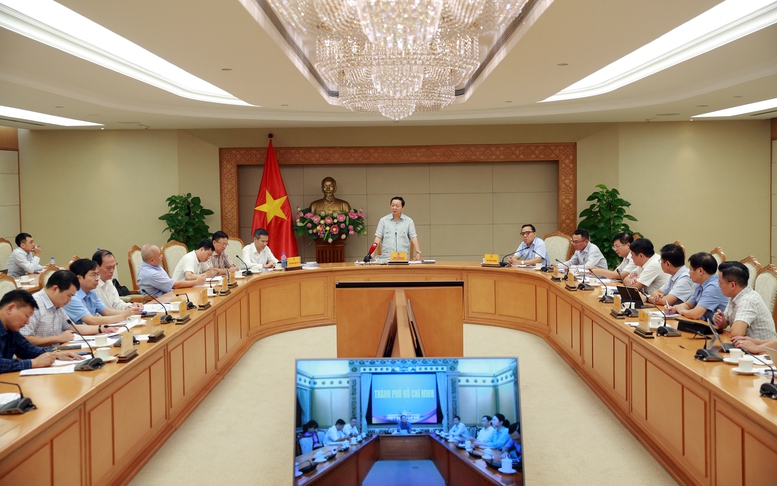The Deputy Prime Minister emphasized the need for consistency and a scientific approach to technical and economic efficiency when developing the Decree within the overall planning and implementation plan of Power Plan VIII, for the common responsibility, there must be no delay in ensuring energy security and meeting the needs of socio-economic development.
Simple, convenient policy, no new procedures arising
After receiving comments from ministries, branches, businesses, and experts, the Ministry of Industry and Trade (MOIT) has adjusted and supplemented the incentive policy in the direction: Organizations and individuals installing SRSP without connecting to the national power system are given priority to develop unlimited capacity and are exempted from electricity operating licenses.

Deputy Prime Minister Tran Hong Ha assigns MOIT, EVN, and relevant units to urgently develop and submit to Prime Minister adjustments to national power development plan.
In the case of SRSP with an installed capacity of over 1 MW and choosing to sell surplus power to the national power system, organizations, and individuals must carry out procedures to request a license to operate electricity following the provisions of the law.
MOIT has received comments from ministries, branches, and the Hanoi People's Committee on shortening and simplifying the procedures for registration of development, the process of investment, construction, and acceptance of SRSP.
Accordingly, households and individual houses provide installation design drawings, and copies of construction permits for existing works (if any) in accordance with the provisions of law.
The remaining customers (factories, industrial parks, offices, etc.) provide solar power installation design drawings, copies of investment policies, construction permits, fire prevention and fighting acceptance tests, results of acceptance for existing construction works, etc.
Provincial People's Committees are responsible for developing and promulgating a simplified process for implementation as per legal procedures to ensure convenience and create favorable conditions for organizations and individuals when registering for development, investment in construction, and installation of SRSP; decentralizing state management to lower-level agencies to guide organizations and individuals in developing, investing in construction, installation, acceptance, and operation according to the provisions of law on investment, construction, fire prevention and fighting, environment, and electricity.
The Deputy Prime Minister requested MOIT to consider the regulations on granting registration certificates for the development of self-produced and self-consumed solar power in private homes and offices to be as simple as possible, without creating new administrative procedures.
Maximum of 20% of installed capacity can be sold
Regarding the plan to buy and sell surplus power to the national power system, MOIT proposed a rate of 20% of the actual installed capacity in the North and 10% in the remaining regions. Vietnam Electricity will pay organizations and individuals for the surplus power output to the national power system at a price lower than or equal to the average market electricity price in the previous year announced by the power system and electricity market operator to ensure appropriate incentives in each development period of the national power system.
President and CEO of Vietnam Electricity (EVN) Nguyen Anh Tuan said that the entire North currently has about 700MW of rooftop solar power, while the system capacity can receive about 7,000MW. Mr. Do Van Nam, Member of the Board of Members of the Northern Power Corporation, calculated that with the provisions in the draft Decree, people will save power when using electricity during peak hours, along with the price of selling surplus electricity to the system, after about 5-6 years, households can recover their investment capital, while the lifespan of a solar panel is currently about 12-15 years.
"There is still a lot of room for rooftop solar power development in the North, so there must be policies to encourage investment and effective development," the Deputy Prime Minister emphasized and requested MOIT to review load demand, transmission capacity, and system safety as a basis for adjusting planning and implementation plans, opening "room" for SRSP, especially in the Northern region.
In addition, the Deputy Prime Minister requested MOIT to study and agree on the rate of selling surplus power from SRSP to the national power system at 20% of the actual installed capacity.
The draft Decree also adds provisions on acceptance of the metering system and remote metering data collection, on-site monitoring and control systems, and information connection with the collection, monitoring, and control systems of the distribution dispatch level of SRSP connected to the national power system. Accordingly, the installed capacity level of less than 100 kWh will be connected to the power unit's system. The installed capacity level of more than 100kWh (whether or not to sell surplus power to the national power system) must be connected to the power distribution dispatch level.
The Deputy Prime Minister noted that there must be technical management solutions to control the capacity of SRSP sources to ensure system safety; especially power sources connected to the medium-voltage grid.
Expanding "room" for self-produced and self-consumed rooftop solar power
The Deputy Prime Minister assigned MOIT (MOIT), EVN, and relevant units to calculate the load demand, the ability to ensure system safety, and the transmission network in localities and regions when mobilizing SRSP connected to the national power system, to submit to the Prime Minister for adjustment of the national power development plan.
Regarding transitional regulations for organizations and individuals that have developed SRSP in the national power development planning period after December 31, 2020, the draft Decree stipulates that organizations and individuals that have installed SRSP that is not connected to the national power system must send relevant information to the competent authority that issues the development certificate to record the scale and location.
Households and individual houses that have installed SRSP and are connected to the national power system shall send relevant information to the competent authority issuing the power development certificate to recognize the scale and location. In case of registration to supplement the generated surplus power to the national power system, the provisions of this Decree shall apply.